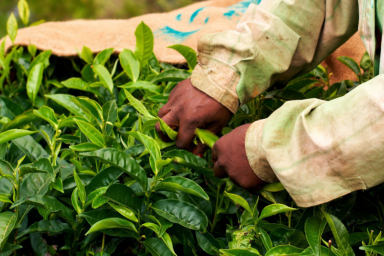How to be a sustainable food brand
Food and drink manufacturing is an important sector of the UK economy.
When combining output, turnover, and sales it contributes more than all other manufacturing types.
UK food and drink manufacturing businesses directly employ more than 468,000 people and generate around £20bn in annual exports.
With such a reach, food brands have a considerable role to play in helping the UK meet its target of becoming net zero by 2050.
This guide outlines how UK food brands can become more eco-friendly.
The UK Government's Food Industry Sustainability Strategy (PDF, 2.4 MB) encourages food businesses to take action in making their processes and products more sustainable.
Customer demand is a major driver, too as they seek a more eco-friendly lifestyle.
Research in February 2022 showed almost half of consumers want to cut their carbon footprint through food.
Sustainable sourcing and ingredients
Sourcing seasonal food products from local suppliers could slash a business' carbon footprint, cut transport costs, and improve the quality of ingredients.
It can also help reduce food waste because they may be more at risk of damage or spoilage the longer products spend in transit.
Other ways to improve your sourcing include selecting organic and Fairtrade products.
If you use ingredients such as palm oil, which has traditionally been a major driver of deforestation, make sure it is sustainable. Similarly, fish should also be sustainably sourced.
To help, you could considering working with suppliers endorsed by the Marine Stewardship Council or Aquaculture Stewardship Council.
Sourcing sustainable food can help to generate more sales and there's an increasing demand for organic food.
The UK's organic food sector grew 5.2% in 2021, with shoppers spending almost £60 million on organic products every week.
Sustainable packaging
Food brands can ensure their packaging is as sustainable as possible by using compostable or fully recyclable delivery packaging and recycle any packaging from suppliers.
Before selecting a supplier, it could be working checking that they have sustainable packaging processes to limit waste.
The UK Government's Plastic Packaging Tax applies to businesses that have manufactured or imported ten or more tonnes of finished plastic packaging components within the last 12 months.
Another possible way to reduce the amount of packaging that you use is to examine how you position products in packaging – you may be able to use smaller containers and fewer fillers.
You might also want to consider the Zero waste model.
An example is subscription services that provide products for refillable containers delivered in plastic-free and compostable packaging.
Sustainable food delivery
When it comes to delivery, the most sustainable option is to work with companies that use green vehicles such as electric vans and e-cargo bikes or those powered by green fuel.
You could also offer green delivery time slots to customers, which involves grouping orders in particular areas to improve fuel efficiency.
If you charge for delivery, you could incentivise customers to book green delivery slots by making them cheaper than other times.
If you have your own delivery drivers, it could be worth ensuring they are trained to drive sustainably and conserve fuel.
Tips suggested by the Energy Saving Trust (PDF, 3.4 MB) include:
- anticipating situations and other road users to avoid unnecessary braking and acceleration
- when slowing down, remaining in gear but taking your foot off the accelerator as early as possible
- avoiding excessive speed
- using air conditioning sparingly.
Conserve water
Only 1% of the world’s water is suitable for human use.
According to the World Economic Forum, the gap between global water supply and demand is projected to reach 40% by 2030 if current practices continue.
Food production is very water-intensive, with data from the United Nations Food and Agriculture Organization showing that between 2,000 and 5,000 litres of water are needed to produce an average person's daily food intake.
Steps that businesses can take to reduce water usage include:
- monitoring and controlling the flow of water used for manufacturing to reduce waste
- training staff in efficient water use
- recycling water where appropriate
- Using drip irrigation instead of sprinklers if you grow your own ingredients.
Improve energy efficiency
Food processing and manufacturing is energy intensive, accounting for about 18% of energy consumption by UK businesses and 176 metric tons of carbon dioxide per year (PDF, 121 KB).
Food brands can help reduce this figure by reviewing production pipelines to see where, when, and how energy is being used, before setting measures and goals to optimise energy use.
Tips to improve energy efficiency suggested by the Food & Drink Federation (PDF, 37.8 MB) include:
- upgrading equipment to use refrigerants with low global warming potential
- using variable speed drives (VSD) and motors on machinery
- using energy-efficient lighting systems
- switching to renewable energy sources.
Food redistribution
Around 270,000 tonnes of the food that goes to waste each year in the UK is still edible (PDF, 5.4 MB). That's enough for 360 million meals.
If you have unused food that could be safely consumed, you can consider redistributing it to those in need by working with food charities and food banks like FareShare and The Trussell Trust.
You can also use food distribution apps, such as Too Good to Go, to sell surplus products.
As well as the sustainability benefits, these services help reduce the costs resulting from unused food and can help attract new customers.
Disclaimer: We make reasonable efforts to keep the content of this article up to date, but we do not guarantee or warrant (implied or otherwise) that it is current, accurate or complete. This article is intended for general information purposes only and does not constitute advice of any kind, including legal, financial, tax, or other professional advice. You should always seek professional or specialist advice or support before doing anything on the basis of the content of this article.
Neither British Business Bank plc nor any of its subsidiaries are liable for any loss or damage (foreseeable or not) that may come from relying on this article, whether as result of our negligence, breach of contract or otherwise. “Loss” includes (but is not limited to) any direct, indirect, or consequential loss, loss of income, revenue, benefits, profits, opportunity, anticipated savings, or data. We do not exclude liability for any liability which cannot be excluded or limited under English law.
Tags related to content:
Green Decoder
Featuring a glossary of sustainable terms curated in partnership with the Nottingham Business School, Nottingham Trent University, our green decoder is helping smaller businesses decipher the terminology surrounding decarbonisation.



